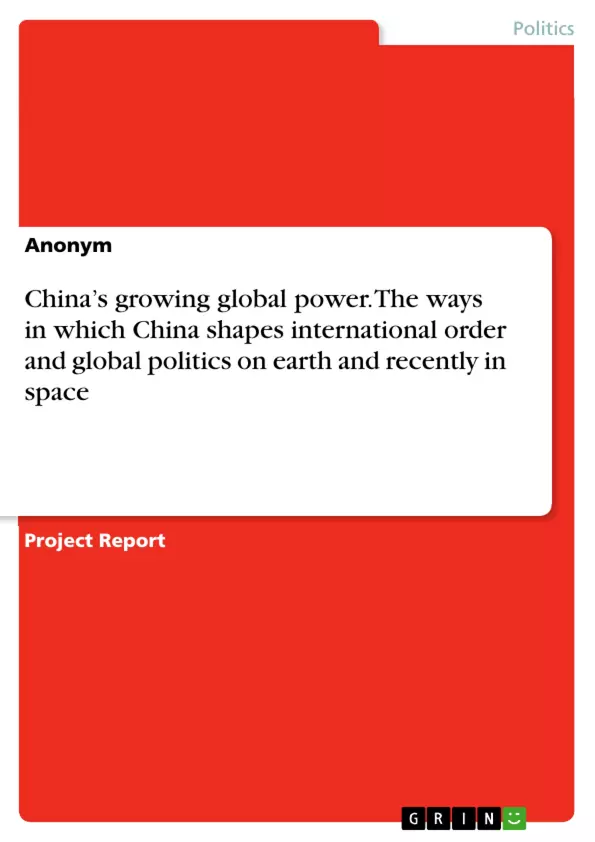This paper aims to elaborate on the extent to which China shapes international order and global politics and whether China’s space policy represents another operational tool to expand global power. In recent years, there have been increasing media reports that China is seeking to establish (more) global power by expanding its activities at high-technological level. This is evidenced particularly by the Republic’s growing space operations.
Inhaltsverzeichnis (Table of Contents)
- 1. INTRODUCTION
- 2. CONTEXT
- 2.1 Concept of the People's Republic of China
- 2.2 China's Security Policy Horizon
- 2.3 Leadership role and independence in future-oriented high-technological areas
- 2.4 Ambitions to be present in space
- 3. ANALYSIS
- 3.1 How China shapes international order and global politics
- 3.2 Xi Jinping's aspirations: new international system with Chinese characteristics.
- 3.3 Global consequences of China's Space Policy
- 4. CONCLUSION
Zielsetzung und Themenschwerpunkte (Objectives and Key Themes)
This paper aims to investigate the extent to which China influences international order and global politics. It particularly explores whether China's space policy serves as a tool to expand its global power. The paper will analyze China's economic, technological, and military advancements, examining how these factors contribute to its growing global influence.
- China's economic and technological rise
- China's security policy and its evolving global presence
- China's space ambitions and its implications for international order
- China's relationship with other global powers, particularly the United States
- The impact of China's foreign policy on the world stage
Zusammenfassung der Kapitel (Chapter Summaries)
- Introduction: This chapter introduces the topic of China's growing global power and its ambitions in the realm of space technology. It highlights the increasing media attention surrounding China's activities at the high-technological level.
- Context: This chapter provides background information on the People's Republic of China, including its population, political system, security policy, and economic aspirations. It examines China's focus on future-oriented high-technological areas and its ambition to become a leader in space exploration.
- Analysis: This chapter delves into the ways in which China shapes international order and global politics. It analyzes the impact of China's economic success, its assertive foreign policy, and its growing military capabilities.
Schlüsselwörter (Keywords)
The main keywords and focus topics of this paper include China's global power, space exploration, international order, global politics, economic development, technological advancement, security policy, foreign policy, and the "Made in China 2025" strategy.
Frequently Asked Questions
How is China shaping the international order?
China influences global politics through economic success, an assertive foreign policy, and leadership in high-technological areas.
What is the role of space policy in China's global power?
Space policy serves as an operational tool to expand influence and demonstrate technological independence on a global scale.
What does "Made in China 2025" signify?
It is a strategic plan to upgrade China's manufacturing base, focusing on high-tech industries to achieve global leadership.
What are Xi Jinping's aspirations for the global system?
He seeks a new international system "with Chinese characteristics" that reflects China's growing status as a superpower.
How does China's security policy impact other nations?
The evolving security horizon and military advancements create new dynamics in international relations, particularly with the United States.
- Citation du texte
- Anonym (Auteur), 2021, China’s growing global power. The ways in which China shapes international order and global politics on earth and recently in space, Munich, GRIN Verlag, https://www.grin.com/document/1166633



